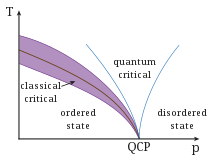| Condensed matter physics |
|---|
 |
In physics, topological order[1] is a kind of order in the zero-temperature phase of matter (also known as quantum matter). Macroscopically, topological order is defined and described by robust ground state degeneracy[2] and quantized non-abelian geometric phases of degenerate ground states.[1] Microscopically, topological orders correspond to patterns of long-range quantum entanglement.[3] States with different topological orders (or different patterns of long range entanglements) cannot change into each other without a phase transition.
Various topologically ordered states have interesting properties, such as (1) topological degeneracy and fractional statistics or non-abelian group statistics that can be used to realize a topological quantum computer; (2) perfect conducting edge states that may have important device applications; (3) emergent gauge field and Fermi statistics that suggest a quantum information origin of elementary particles;[4] (4) topological entanglement entropy that reveals the entanglement origin of topological order, etc. Topological order is important in the study of several physical systems such as spin liquids,[5][6][7][8] and the quantum Hall effect,[9][10] along with potential applications to fault-tolerant quantum computation.[11]
Topological insulators[12] and topological superconductors (beyond 1D) do not have topological order as defined above, their entanglements being only short-ranged, but are examples of symmetry-protected topological order.
- ^ a b Wen 1990
- ^ Wen & Niu 1990
- ^ Chen, Xie; Gu, Zheng-Cheng; Wen, Xiao-Gang (2010). "Local unitary transformation, long-range quantum entanglement, wave function renormalization, and topological order". Phys. Rev. B. 82 (15): 155138. arXiv:1004.3835. Bibcode:2010PhRvB..82o5138C. doi:10.1103/physrevb.82.155138. S2CID 14593420.
- ^ Levin & Wen 2005a See also Levin & Wen 2006a
- ^ Kalmeyer & Laughlin 1987
- ^ Wen, Wilczek & Zee 1989, pp. 11413–23
- ^ Read, N.; Sachdev, Subir (1991). "Large-N expansion for frustrated quantum antiferromagnets". Phys. Rev. Lett. 66 (13): 1773–6. Bibcode:1991PhRvL..66.1773R. doi:10.1103/physrevlett.66.1773. PMID 10043303.
- ^ Wen, Xiao-Gang (1991). "Mean Field Theory of Spin Liquid States with Finite Energy Gap and Topological orders". Phys. Rev. B. 44 (6): 2664–72. Bibcode:1991PhRvB..44.2664W. doi:10.1103/physrevb.44.2664. PMID 9999836. S2CID 1675592.
- ^ Tsui, Stormer & Gossard 1982
- ^ Laughlin 1983
- ^ Kitaev 2003
- ^ Moore, Joel E. (2010). "The birth of topological insulators". Nature. 464 (7286): 194–8. Bibcode:2010Natur.464..194M. doi:10.1038/nature08916. PMID 20220837. S2CID 1911343.